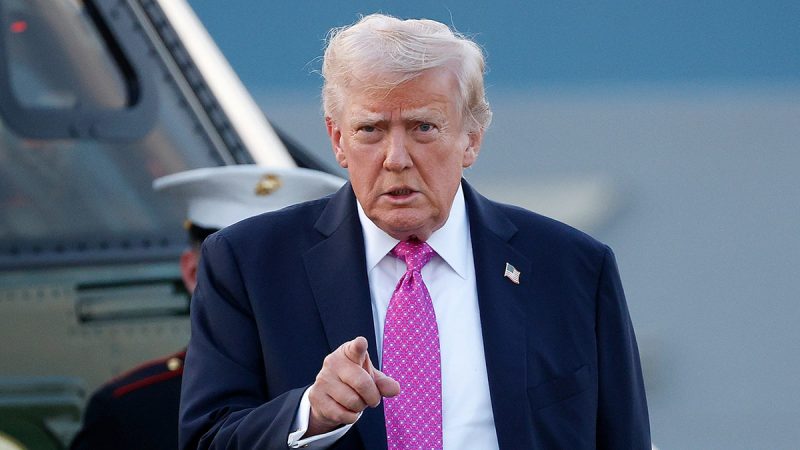President Donald Trump is spearheading a military buildup in the Caribbean — already signing off on a series of U.S. military strikes against alleged drug vessels from Venezuela.
So far, the Trump administration has conducted at least three deadly strikes against alleged drug smuggling boats, prompting some lawmakers in Congress to question the legality of these strikes and request additional oversight.
The strikes are the latest escalation from the Trump administration as it moves to crack down on drug cartels and the influx of illicit drugs into the U.S., and comes after the administration designated drug cartel groups like Tren de Aragua, the Sinaloa Cartel and others as foreign terrorist organizations in February.
Building up naval forces in the Caribbean gives the U.S. the capacity to not only conduct such strikes in international waters near Venezuela, but also within Venezuela itself, according to Geoff Ramsey, a senior fellow at the Atlantic Council international affairs think tank.
In August, Trump approved sending several U.S. Navy guided missile destroyers to bolster the administration’s counter-narcotics efforts in the region.
‘Whether we see more consequential strikes will depend more on political calculations in Washington than on operational capability,’ Ramsey said in a Wednesday email to Fox News Digital. ‘The administration could use the strikes as occasional shows of force, or it could escalate into a more systematic campaign, but the risk of doing so would be that we could destabilize Venezuela and spark an internal armed conflict with no clear end game.’
Ramsey said that the strikes come with a ‘real risk of escalation,’ and said that Venezuela views them as violations of sovereignty. Additionally, attacks inside Venezuelan territory could ignite a ‘cycle of retaliation,’ he said.
‘That would raise the prospect of a wider confrontation between the U.S. and Venezuelan forces, which could potentially end up sparking an internal armed conflict in the South American country, which could destabilize the region,’ Ramsey said. ‘So far President Trump seems aware of these risks, which is why the strikes so far have been carefully framed as counter-narcotics operations in international waters rather than an overt attack on the Venezuelan government.’
After Trump sent the destroyers to U.S. Southern Command, Venezuelan President Nicolás Maduro said his country was prepared to respond to any attacks, adding that the move amounted to ‘an extravagant, unjustifiable, immoral and absolutely criminal and bloody threat.’
Following the second strike, Maduro said the incident is part of a larger effort ‘to intimidate and seek regime change’ in Venezuela. The Trump administration has said it does not recognize Maduro as a legitimate head of state, and rather, views him as a leader of a drug cartel.
Meanwhile, members of Congress have cast doubt on whether the strikes the Trump administration approved are even legal in the first place. For example, Sens. Adam Schiff, D-Calif., and Tim Kaine, D-Va., filed a war powers resolution Friday that would block U.S. forces from engaging in ‘hostilities’ against certain non-state organizations.
‘President Trump has no legal authority to launch strikes or use military force in the Caribbean or elsewhere in the Western Hemisphere. The Administration has refused to provide Congress with basic information about the multiple strikes it has carried out, including who was killed, why it was necessary to put servicemembers’ lives at risk, and why a standard interdiction operation wasn’t conducted,’ Kaine said in a Friday statement. ‘Congress simply cannot let itself be stiff-armed as this Administration continues to flout the law.’
The Senate will be required to consider and vote upon the resolution.
Even so, the Trump administration has indicated from the beginning that it’s prepared for additional strikes.
‘Obviously, they won’t be doing it again,’ Trump told reporters in September after the first military strike. ‘And I think a lot of other people won’t be doing it again. When they watch that tape, they’re going to say, ‘Let’s not do this.’ We have to protect our country, and we’re going to. Venezuela has been a very bad actor.’
Likewise, Secretary of War Pete Hegseth signaled the U.S. military would launch future strikes on other drug vessels attempting to smuggle narcotics into the U.S.
‘We’ve got assets in the air, assets in the water, assets on ships because this is a deadly serious mission for us, and it won’t, it won’t stop with just this strike,’ Hegseth told Fox News in September after the first strike.
‘Anyone else trafficking in those waters who we know is a designated narco-terrorist will face the same fate,’ Hegseth said.
However, the strikes likely will not continue long term as boat traffic in the region dies down in response to the strikes, according to Bryan Clark, director of the Hudson Institute think tank’s Center for Defense Concepts and Technology.
‘These strikes will probably intensify for a couple weeks and then abate as fewer boats attempt to make the crossing. That is likely the intent of the operation,’ Clark said in a Tuesday email to Fox News Digital. ‘I think it is very unlikely to result in a broader conflict because the Venezuelan government will not want one.’
